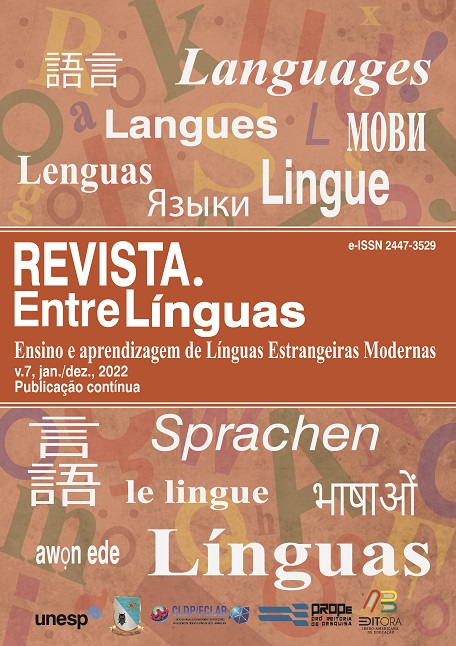The reading circle in english teaching development
An experience report in Letters graduation
DOI:
https://doi.org/10.29051/el.v8i00.15310Keywords:
Reading circle, Language teaching development, Literary ReadingAbstract
This article aims to describe the experience of the reading circle in English literature (drama) course in Letters graduation at IFCE – campus Camocim, by discussing the importance of the activity as a contribution to the development of English teacher in development. For that, we resorted to the conceptions of reading in Koch (2006) and Marcuschi (2008); cognitive processing in Evans and Green (2006); literacy in Kleiman (2000); and the concepts that underlie the reading circle in literature classes in Cosson (2009; 2014). We describe the methodological path for achieving the reading circle as a practice of reading activity and as the formation of literary readers, in addition to presenting the results of the survey form applied to students after the sessions. The results obtained agree with the impressions intuitively acquired during the sessions and show possible directions for future reading circles in English Literature classes in Language courses.
Downloads
References
BAKHTIN, M. Estética da Criação Verbal. São Paulo: Martins Fontes, 1992.
CANDIDO, A. A literatura e formação do homem In: CANDIDO, A. Textos de Intervenção. São Paulo: Duas Cidades, 2002.
COSSON, R. Letramento literário: Teoria e Prática. São Paulo: Contexto, 2009.
COSSON, R. Círculos de leitura e letramento literário. São Paulo: Contexto, 2014.
DANIELS, H. Literature circles: Voice and choice in Books Clubs and Reading Groups. 2. ed. Portland, Maine: Stenhouse Publishers, 2002.
DUNCAN, S. Reading Circles, Novels and Adult Reading Development. London: Continuum, 2012.
EVANS, V.; GREEN, M. Cognitive Linguistics: An Introduction. Edinburgh: Edinburgh University Press, 2006.
FAUCONNIER, G. Mappings in thought and language. Cambridge: Cambridge University Press, 1997.
FLORES, O. C; GABRIEL, R. O quebra-cabeça da leitura: Leitor, texto, autor. In: MOURA, H.; GABRIEL, R. (org.). Cognição na linguagem. Florianópolis: Insular, 2012.
IFCE. Projeto pedagógico do curso – PPC. Licenciatura em Letras Português/Inglês e suas respectivas literaturas. Camocim: Instituto de Ciência e Tecnologia do Ceará, 2017.
KLEIMAN, A. B. Modelos de letramento e as práticas de alfabetização na escola. In: KLEIMAN, A. B. (org.). Os significados do letramento: Uma nova perspectiva sobre a prática social da escrita. Campinas, SP: Mercado de Letras, 1995.
KLEIMAN, A. Abordagens da leitura. Scripta, Belo Horizonte, v. 7, n. 14, p. 13-22, 2004. Disponível em: http://periodicos.pucminas.br/index.php/scripta/article/view/12538. Acesso em: 17 out. 2020.
KOCH, I. G. V. Desvendando os segredos do texto. São Paulo: Cortez, 2006.
MARCUSCHI, L. A. Produção textual, análise de gêneros e compreensão. São Paulo: Parábola Editorial, 2008.
Published
How to Cite
Issue
Section
License

This work is licensed under a Creative Commons Attribution-NonCommercial-ShareAlike 4.0 International License.
Os manuscritos aceitos e publicados são de propriedade da Revista EntreLínguas. Os artigos publicados e as referências citadas na Revista EntreLínguas são de inteira responsabilidade de seus autores.
Transferência de direitos autorais – autorização para publicação
Caso o artigo submetido seja aprovado para publicação, já fica acordado que o(s) autor(es) autoriza(m) a UNESP a reproduzi-lo e publicá-lo na EntreLínguas, entendendo-se os termos “reprodução” e “publicação” conforme definição respectivamente dos incisos VI e I do artigo 5° da Lei 9610/98. O artigo poderá ser acessado pela rede mundial de computadores (Internet), sendo permitidas, a título gratuito, a consulta e a reprodução de exemplar do artigo para uso próprio de quem a consulta, desde que haja a citação ao texto consultado. Essa autorização de publicação 328 EntreLínguas, Araraquara, v. 1, n .2, p. 323-328, jul./dez. 2015 não tem limitação de tempo, ficando a UNESP responsável pela manutenção da identificação do(s) autor(es) do artigo. Os artigos publicados e as referências citadas na Revista EntreLínguas são de inteira responsabilidade de seus autores.











